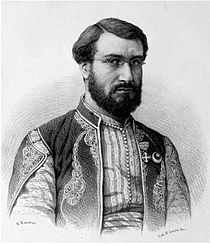Victor Langlois
| Victor Langlois | |
|---|---|
 |
|
| Born |
20 March 1829 Dieppe, France |
| Died | 14 May 1869 (aged 40) Paris, France |
| Occupation | Historian, archaeologist, professor, numismatist, and orientalist |
|
|
|
| Signature |  |
Victor Langlois (20 March 1829 – 14 May 1869) was a French historian, archaeologist, professor, numismatist, and orientalist who specialized in the study of the Middle Ages. Langlois was particularly known for his work on Armenian history and culture. He authored more than thirty books on Armenian history.
Victor Langlois was born on rue Sygogne in Dieppe, France on 20 March 1829. He was educated at the École Nationale des Chartes and Institut national des langues et civilisations orientales. On 7 May 1852, at the age of 23, he received orders from the French government to visit the predominately Armenian populated area of Cilicia in the Ottoman Empire to carry out studies about historic French and Armenian relations. In particular, Langlois was tasked with studying Armenian-French relations during the Crusades, and to uncover archaeological findings. Remaining in Cilicia until 1853, Langlois published a book on his findings in 1861 entitled Voyage dans la Cilicie et dans les montagnes du Taurus (Travels in Cilicia and the Taurus Mountains).Terracotta figures which he had found in his excavations in the necropolis of Tarsus were exhibited in the Louvre.
Between the year 1857 and 1861, Langlois traveled in Italy in order to discover more historical information concerning the relations between France and Armenia during the Crusades. His other works relate to Egyptian and Georgian numismatics (1852), and to the convent of San Lazzaro degli Armeni of the Armenian Mekhitarist congregation, with an outline of Armenian history and literature (1862). During this time, in 1863, he published a book about the massacres of Armenians by Turks entitled Les Armeniens de la Turquie et les Massacres du Taurus (The Armenians of Turkey and the Taurus massacres). In 1867 he published Le mont Athos et ses monasteres, with a photo-lithographic reproduction of the geography of Ptolemy, of which the Greek manuscript of the 17th century is preserved in that monastery. He became a professor at the Collège de France in Paris. The first volume of his Collection des historiens anciens et modernes de l'Armenie, a translation from the Armenian language, was published in 1868, under the auspices of the Egyptian-Armenian prime minister Nubar Pasha, but he did not live to complete the work.
...
Wikipedia
